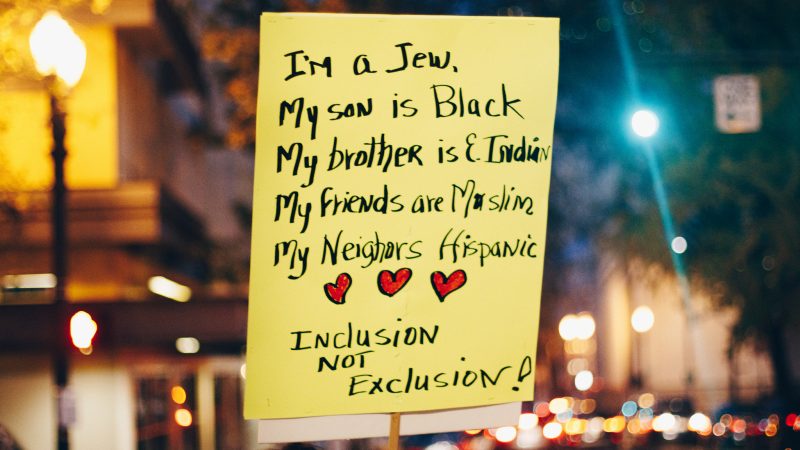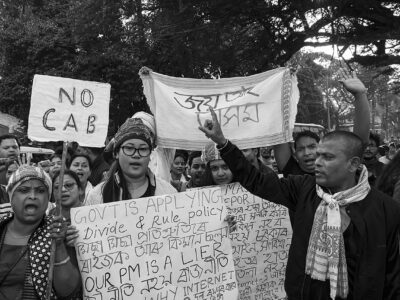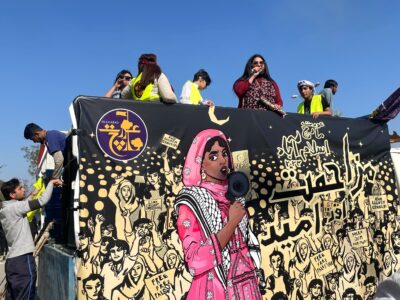
Sora-baventy manohitra ny fanafihan'ny mpankahala vahiny ao Etazonia. Sary tao amin'ny Flickr, Roscoe Myrick (www.shotboxer.com). CC BY 2.0
Toa tsy ho an'ireo Indiana maro ao Etazonia intsony ny fitoviana sy ny nofy Amerikana, hatramin'ny niasan'ny filoha Donald Trump. Nampiahiahy olona marobe manerantany ny volana maromaro lasa, ary taitra manokana ny Indiana raha nahafantatra ny namonoana injeniera Indiana iray antsoina hoe Srinivas Kuchibhotla noho ny antony voalaza fa fanavakavaham-bolokoditra. Mandritra izany, manohy mametraka ny “fandraràna Miozolomana” mampiadihevitra, miady amin'ny rafi-pitsarana Amerikana, ny Trano Fotsy
Vokatr'izany, miha betsaka ireo olona ao India voalaza fa nanomboka nanoro hevitra ny naman'izy ireo sy ny fianakavian'izy ireo mba tsy hitsidika an'i Etazonia, na noho ny asa na noho ny fianarana.
Maty voatifitra tao amin'ny toeram-pisotroana iray ao Kansas i Kuchibhotla tamin'ny volana Febroary, ary nanaraka izany ny fanafihana Indiana hafa izay nantsoin'ny tranonkala Socialistworker.org fa “andiana herisetra mihatra amin'ireo Aziatiaka Atsimo.”
Nilaza ireo mpitsikera an'i Trump fa anisan'ny tompon'andraikitra tamin'ny fitomboan'ny vondrona mpankahala mikendry ny Amerikana Latina, Miozolomana, Amerikana Afrikanina, sy ny fiarahamonina LGBT ny kabarin'i Trump.
Tamin'ny 28 Febroary, namoaka taratasy mampihetsi-po momba ny fahafatesan'ny vadiny tao amin'ny Facebook ny vady navelan'i i Kuchibhotla, nilaza ny fikasany hijanona ao Etazonia sy hanohy ny nofinofin'ny vadiny:
We built our dream home, which he painted, and installed the garage door. Doing any kind of work on his home gave him immense joy. This was the home that he had built […] for us and any kids we would have. [It was] our first step to starting our family. It's so unfortunate that this dream of ours is now shattered.
Nanorina ny trano nofinofinay izahay, izay nolokoiny, ary nametraka ny varavaran'ny garazy izy. Nanome fifaliana lehibe ho azy ny fanaovana karazan-draharaha tao an-tranony. Izany no trano naoriny […] ho anay sy ny zanaka tianay hananana. [Izany] no dingana voalohany nanombohanay [amin'ny fananganana] ny fianakaviana. Tena mampalahelo fa rava izany nofinay izany ankehitriny
Nandritra ny volana Febroary sy Martsa, namaly ny hafatr'i Dumala sy ny famonoana ny vadiny ireo mpisera Twitter Indiana maromaro
Ny sasany kosa nitady fepetra henjana mba hanavotana ireo Indiana amin'ny governemanta:
India should very forcefully intervene for 2 Indians with Indian passport and let US deal with the plight of other 2 who are Americans. https://t.co/lRYhvBth82
— ?????? ????? (@KanchanGupta) March 6, 2017
Tokony hirotsaka an-tsehatra an-tery tanteraka ho an'ireo Indiana roa manana pasipaoro Indiana i India ary mamela an'i Etazonia hifampiraharaha momba ny manjò an'ireo Amerikana roa hafa.
Ny hafa indray nihaika tamin'esoeso amin'ny fampitandremana ireo avy ao Etazonia ho any India
Shouldn't this travel advisory for US visitors to India be the other way around?
https://t.co/e22Bucw4iM— Suhasini Haidar (@suhasinih) March 7, 2017
Tsy tokony ho zavatra hafa ve ity torohevitra momba ny dian'ny mpitsidika avy ao Etazonia ho ao India ity?
Time to stand against the Racial attacks on Indians in US. Fail to understand, why Indians are attacked in the name of !!
— Keshav P. Kumar (@KeshavPKumar) March 7, 2017
Fotoana hitsanganana manoloana ny fanafihana Ara-poko mihatra amin'ireo Indiana ao Etazonia. Tsy mety mahatakatra, nahoana ny Indiana no tafihana amin'ny anarany!!
Indians are attacked and killed in US. Cant see any actions for govt or amy protests from other political parties. Is US the reason?
— Sharon (/) Vishnu (@OhMG_Me) March 6, 2017
Tafihana sy vonoina ho faty ao Etazonia ny Indiana. Tsy mahita fepetra avy amin'ny governemanta na fanoherana avy amin'ny antoko politika hafa. Etazonia ve no antony?
Nandanjalanja amin'ny tsy fihetsehan'i India manoloana ireo fanafihana kosa ny manam-pahaizana sasany:
If Indians with American passports are attacked, Indian govt has right to worry about copycat crimes affecting its own citizens in US 2/n
— Ashok Malik (@MalikAshok) March 6, 2017
Raha voatafika ny Indiana manana pasipaoro Amerikana, manan-jo hiahiahy amin'ny heloka maka tahaka mitovy amin'izany mihatra amin'ireo olom-pireneny manokana ao Etazonia ny governemanta Indiana 2/n
Mpanao gazety Indiana malaza, Barkha Dutt nanasongadina ity fironam-baovao ity:
Hope Indians who thought Trump would be “good for us” can see see how this US political environment encouraged hate crimes against our own
— barkha dutt (@BDUTT) February 25, 2017
Manantena fa mahita ity tontolo ara-politika Amerikana mandrisika heloka bevava noho ny fankahalana antsika ity ankehitriny ireo Indiana nihevitra fa “tsara ho antsika” i Trump.
Niahiahy tsotra izao ireo Indiana maro:
Nonsense, Indians have been racially attacked earlier in the USA under various govts. A few years back US cops crippled a Indian grandfather https://t.co/nHP9U8dG7s
— Shankara (@Sshankara) February 26, 2017
Hadalàna, efa nisy nanafika ara-poko tao Etazonia nandritra ireo governemanta isan-karazany ny Indiana. Efa nisy polisy Amerikana nidaroka raibe Indiana taona vitsy lasa izay.
Raha te-hahafantatra bebe kokoa momba ny fiainan'ireo Indiana ao amin'i Amerikanan'i Donald Trump, dia niresaka tamin'ny tanora Indiana roa mikasika ny fikasan'izy ireo tsy tanteraka hianatra any Etazonia ny Global Voices
Nimanniyu Sharma, mpisolovava
Global Voices: Inona no ataonao ary inona no nianaranao?
Nimanniyu Sharma (NS): I'm a practicing advocate working with the Dispute Resolution [litigation] wing of a law firm in New Delhi. I've graduated from the University Institute of Legal Studies, Panjab University, Chandigarh.
Nimanniyu Sharma (NS): Mpisolovava amin'ny Famahàna Fifandirana [ady], sampana lalànan'ny orinasa ao New Delhi aho. Nahazo diplaoma tamin'ny Oniversite Fianarana Lalàna, Oniversite Panjab, Chandigarh aho.
Global Voices: Taiza no nirianao hianarana ao Etazonia?
NS: I was targeting various universities for pursuing an LL.M. in the U.S. Some of my top choices would have been Northwestern, UPenn, NYU, Columbia, etc.
Reasons to pursue the same were that the U.S. used to be a very welcoming environment, especially for my industry, in terms of getting jobs and joining the academia. Compared to other markets, it has a voluminous business which inherently increased the number of transaction to work on and therefore the country was more viable for survival because of the booming business. In the past few years, it had also come to be known for its receptivity for immigrants, which sadly isn't the case anymore.
NS: Nikendry ireo oniversite isan-karazany aho mba hanohy ny LL.M. [taranja lalàna] ao Etazonia. Tao Avaratra Andrefana, tao amin'ny UPenn, tao amin'ny NYU, tao amin'ny Columbia, sns. ny sasany tamin'ireo safidiko voalohany.
Ny antony nanohizana ny fianarana tany dia i Etazonia no firenena tia mandray olona indrindra tamin'izany, indrindra tao amin'ny tontolon'asako, eo amin'ny resaka fahazoana asa sy ny fidirana amin'ny akademia. Raha oharina amin'ny tsena hafa, dia manana fihariana matevina izy izay nampitombo ny isan'ny fifanakalozana arak'asa ary mora iavota-tena ny firenena noho ny firoboroboan'ny fihariana. Tao anatin'ny taona vitsy, fantatra tamin'ny fahaizany mandray mpifindra-monina ihany koa izy, izay indrisy fa tsy izany intsony ankehitriny.
Global Voices: Inona no tsy handehananao intsony any Etazonia?
NS: The recent state of affairs has been extremely detrimental to my plans of pursuing further education and seeking a job opportunity in the U.S. Even though the geographical locations of the universities of my choice are extremely progressive cities that are minimally affected to date, I still strongly believe that this is only the beginning of a downhill path under the leadership governing the U.S. currently. I'd never risk my life for a shot at a successful career.
NS: Nanimba tanteraka ny fikasako hanohy fianarana sy hitady asa ao Etazonia ny raharaham-panjakana vao haingana tao Etazonia. Na dia tanàna liam-pandrosoana tanteraka izay tsy dia nisy fiantraikan-javatra ratsy aza hatramin'izao ny toerana ara-jeografikan'ny oniversite nosafidiako, dia mbola mihevitra loatra aho fa fanombohan'ny fitsontsorika eo ambany fitarihan'ny mpitantana an'i Etazonia amin'izao fotoana izao izany. Tsy hanao sorona ny aiko ho voatifitra ao anaty fahombiazan'asa aho.
Global Voices: Ahoana ny hevitrao tamin'ny fanafihana an'ireo Indiana vao haingana tao Etazonia?
NS: I've been deeply saddened, but the one incident closest to me, which has rather “scared” me, is one that happened to a cousin of mine.
Only a few days after Mr. Trump took office, while awaiting a (white) friend's arrival at a bar in Philadelphia, my cousin was made to feel extremely unwanted at the premises by the bartender. He refused to serve her despite multiple reminders and requests from her. As soon as her (white) friend arrived, the bartender, unaware of the fact that he was friends with my cousin, offered him another seat at the bar in case he wanted to sit away from the “browns.” I had never imagined this happening to a person whom I know and I'm close to. It suddenly made the issue “real” for me. After this, all the other incidents of verbal and physical attacks on Indians in the U.S. have been further strengthening my decision to not go to the U.S. anymore.
I pray for my fellow [countrymen] residing in that country — for their safety and solidarity.
NS: Nalahelo tanteraka aho, saingy ny loza akaiky ahy, izay tena nampatahotra ahy kokoa dia ny iray tamin'ireo nitranga tamin'ny anabaviko iray zanaky ny iray tampo amin'ny ray aman-dreniko.
Andro vitsy monja taorian'ny nandraisan'i Trump ny asany, raha niandry ny fahatongavan'ny namana (fotsy hoditra) tao amin'ny toeram-pisotroana toaka ao Philadelphia ity anabaviko ity, dia nataon'ny mpiasan'ny toeram-pisotroana izay nahatsapan'ny anabaviko fa manelingelina izy tao amin'ilay toerana. Tsy nety nandray azy izy na dia teo aza ireo fampahatsiahivina marobe sy fangatahana avy aminy. Raha vao tonga ny namany (fotsy hoditra), nanome seza hafa ho azy tao amin'ny toeram-pisotroana ilay mpiasan'ny bar raha toa izy te hipetraka mihataka amin'ny “matroka”, tsy mahafantatra ity mpiasa ity fa naman'ilay anabaviko izy. Tsy nieritreritra velively aho fa hitranga amin'ny olona fantatro sy akaiky ahy izany. Nampihevitra ahy tampoka izany fa “zavamisy” ity olana ity. Taorian'izany, nanamafy ny fanapahan-kevitro tsy hankao Etazonia intsony ny fanafihana am-bava sy ara-batana hafa nihatra tamin'ireo Indiana ao Etazonia.
Mivavaka ho an'ny namako [mpiray tanindrazana] monina ao amin'izany firenena izany aho — ho an'ny filaminan'izy ireo sy ny firaisankina.
Inona no safidy hafa savasavainao ankehitriny?
(NS): Since the U.S. was never the “only” destination that I was planning for further education, I am now prioritizing European, Canadian, and Asian law schools.
(NS): Tsy i Etazonia ihany no toerana “tokana” nokasaiko hanohizana ny fianarana, Nataoko loha-laharana ankehitriny ny sekolin'ny lalàna Eoropeana, Kanadiana ary Aziatika.
Shadab Nazmi, mpanao gazety multimedia
Global Voices: Nanao ahoana ny zava-niainanao voalohany tao Etazonia?
Shadab Nazmi (SN): I was 16 when I first visited the U.S. It was beautiful, people were friendly, and [they] always stepped forward in case [to offer] any help. But that was way back in 2007 and I was living in a very small town called Westport in Indiana.
Shadab Nazmi (SN): Tamin'izaho 16 taona no nitsidika voalohany an'i Etazonia. Nahafinaritra izany, tia namana ny olona, ary vonona foana [izy ireo] hanampy raha ilaina. Saingy efa tamin'ny 2007 izany ary nonina tamin'ny tanàna tena kely antsoina hoe Westport ao Indiana aho.
Global Voices: Inona no nitranga nandritra ny antsafa hahazoana visa?
SN: The first interview went smoothly when I went on a U.S.-State-Department-sponsored scholarship program in 2007. I was immediately given J1- exchange visitor visa after a few questions, such as how long would I be there? Where was I going to stay? Who was sponsoring my trip? But in 2011, when I decided to visit my host family, my visa was rejected twice. I was told that [U.S. officials] see me as a potential immigrant, and I didn't have enough social ties [in India], which would prove my [likeliness] to return.
SN: Nilamina ny antsafa voalohany raha namonjy ny fandaharana nahazoana vatsim-pianarana taona 2007 avy amin'ny Sampam-panjakana Amerikana aho. Nomena visa ho an'ny mpitsidika nifanakalozana J1 avy hatrany aho taorian'ny fanontaniana vitsivitsy tahaka ny hoe hafiriana no hijanonako ao? Aiza aho no hipetraka? Iza no miantoka ny diako? Saingy tamin'ny taona 2011, raha nanapa-kevitra hitsidika ny fianakaviana nampiantrano ahy aho, nolavina indroa ny visa-ko. Nolazaina tamiko fa mahita ahy ho mety ho mpifindra-monina ny [manampahefana Amerikana], ary tsy dia manana fifandraisana ara-tsosialy ao [India] aho, izay entina manaporofo ny fitiavako hiverina.
Global Voices: Mbola ho any Etazonia ihany ve ianao?
SN: Yes, definitely. I hold the B1/B2 visa which is valid till 2022. I get a little scared when I think of the immigration check because every time I landed in the U.S. — be it Chicago, Newark, or Dulles — I'm detained every time and cross-questioned by three different officers about the purpose of my trip.
SN: Eny indrindra. Manana visa B1/B2 aho izay manankery hatramin'ny taona 2022. Somary matahotra aho rehefa mieritreritra ny fanamarinana fifindra-monina isaky ny mankao Etazonia — na izany ao Chicago, na Newark, na Dulles — Voatazona hatrany aho ary ametrahan'ireo polisy telo samihafa fanontaniana momba ny tanjon'ny diako.
Global Voices: Ahoana ny hevitrao amin'ny lahateny mankahala vahiny sy ny kabary mamely ny Miozolomana sy ny fiarahamonina LGBT ataon'ireo mpanohana marobe an'i Trump?
SN: Xenophobia and racism started to emerge even before Trump was elected. I have two friends who were trying to pursue PhDs at Princeton, but have now switched to Osaka University in Japan. […] And their parents were really concerned after the shooting […] in Kansas.
SN: Nanomboka nirongatra ny fankahalana vahiny sy ny fanavakavaham-bolokoditra talohan'ny naha-voafidy an'i Trump. Manana namana roa niezaka nanohy ny fianarany PhDs tao Princeton aho, saingy nifindra tao amin'ny Oniversite Osaka ao Japana ankehitriny. […] Ary niahiahy fatratra taorian'ny fitifirana tao Kansas ny ray aman-drenin'izy ireo.
Global Voices: Te hanome torohevitra ho an'ireo hafa hitsidika an'i Etazonia ankehitriny ve ianao?
SN: Only if you are going to visit for just a few days. With an F1 visa, you can definitely study in a university, but there is a high chance that you might not get an H1-B, because American employers aren't willing to pay more than $35,000 a year for an entry level job.
SN: Raha handeha hitsidika mandritra ny andro vitsy monja ianao. Miaraka amin'ny visa F1, afaka mianatra tanteraka amin'ny oniversite, saingy misy ny herijika lehibe fa mety tsy hahazo H1-B ianao, satria tsy te handoa vola mihoatra ny 35.000 dolara isan-taona amin'ny ambaratongan'asa ny mpampiasa Amerikana.
Global Voices: Niatrika fanavakavaham-bolokoditra ve ianao tamin'ny dianao farany tany Etazonia?
SN: I was often told jokingly “Thank you, come again,” referring to the Indian character “Appu” from The Simpsons. But there were a couple of times in high school when I was called “7-11” [after the convenience store chain, run largely by members of the Indian diaspora in the U.S.], instead of my name.
SN: Matetika aho vazivaziana hoe “Misaotra, tongava indray amin'ny manaraka,” manondro ny toetran'ny Indiana “Appu” ao amin'ny [fandaharana fahitalavitra] Simpsons. Saingy indroa izay, tao amin'ny sekoly ambony, nantsoina hoe “7-11” [ilazana ireo magazay misokatra mandavataona, tantanin'ireo Indiana am-pielezana marobe ao Etazonia.] aho fa tsy tamin'ny anarako
Satria mikasa hampihena ny visa H-1B i Etazonia ary hanavao ny fitantanana visa i Aostralia, Aziatika marobe, tahaka ny Shinoa sy Indiana no hahita fa ho sarotra ny hifindra toerana any amin'ny firenena anjakan'ny fahafaha-mihary ara-toekarena, izay manasarotra ny fironana ao anaty fanantontoloana izay namolavola ireo andian-taranaka faramparany.








